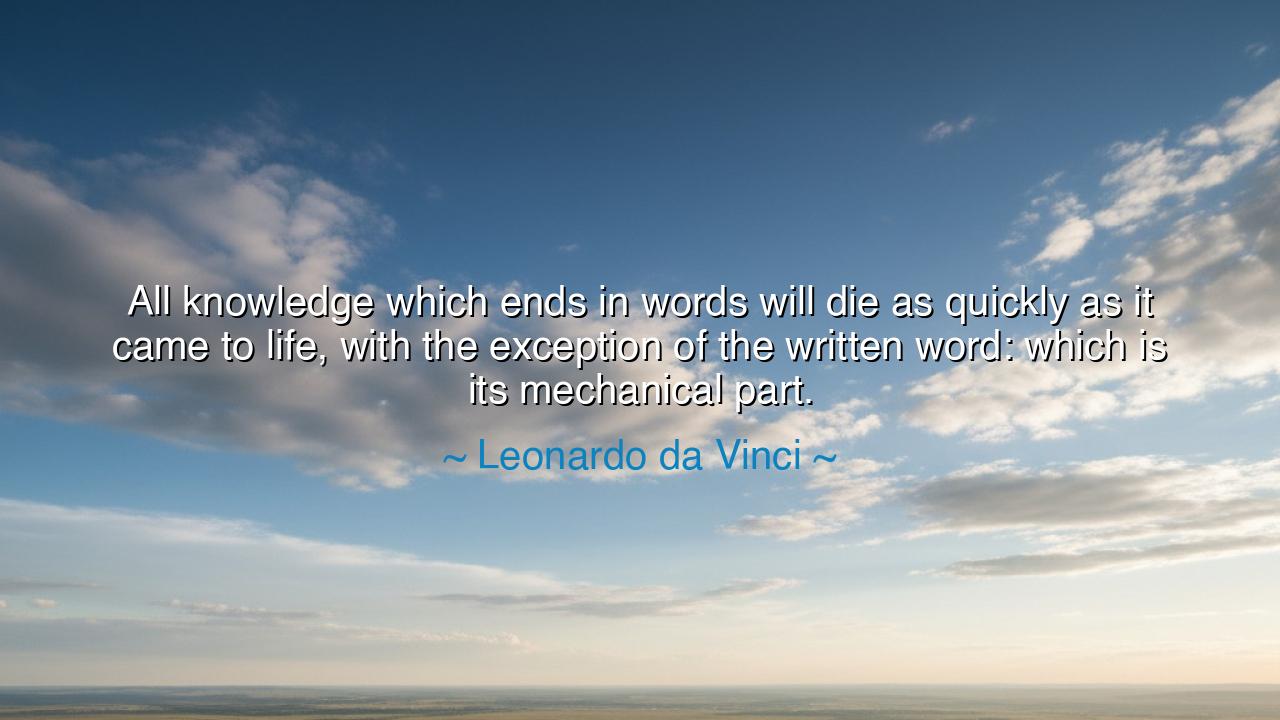
All knowledge which ends in words will die as quickly as it came
All knowledge which ends in words will die as quickly as it came to life, with the exception of the written word: which is its mechanical part.






"All knowledge which ends in words will die as quickly as it came to life, with the exception of the written word: which is its mechanical part." So spoke Leonardo da Vinci, the titan of the Renaissance, whose mind stretched like a bridge between the heavens and the earth. His words remind us that knowledge, like breath upon glass, fades quickly if not captured. Spoken words, though swift and bright, vanish on the wind; but the written word, carved into parchment, etched into stone, or pressed into books, endures beyond generations, beyond empires, beyond the fleeting life of the speaker.
The meaning of this truth is both sorrowful and profound. Human beings are creatures of memory, yet memory is frail. A story told by mouth may kindle the heart, but it is soon twisted, forgotten, or lost. Without writing, wisdom perishes as swiftly as a flame starved of air. Leonardo calls the written word the “mechanical part” of knowledge—not its spirit, not its soul, but the structure by which that soul is preserved. Just as a vessel carries water across the sea, so writing carries wisdom across time. Without it, even the greatest insights dissolve into silence.
History shows us this clearly. The Library of Alexandria once held the writings of countless cultures, a treasury of knowledge beyond measure. When it was consumed by fire, the loss was not of buildings, but of voices—thousands of thinkers whose words, had they remained only spoken, would now be nothing. Yet because fragments were written, copied, and preserved, we still hear echoes of Homer, Aristotle, Euclid, and countless others. Their living voices are long gone, but through their writing, their wisdom still shapes our lives. Here is the power of the “mechanical part”: to rescue knowledge from death.
Think too of the medieval monks, who in cold stone monasteries bent over manuscripts by candlelight. The world outside was torn by war, kingdoms rose and fell, but these quiet scribes saved the works of the ancients. They copied and preserved words that might have been lost forever, ensuring that Plato, Cicero, and Augustine would live again when Europe emerged from the shadows. Their toil is proof that writing is not merely ink on page—it is a lifeline thrown across centuries, connecting minds that never met in flesh, but meet in thought.
Yet Leonardo also warns us: the written word is the mechanical part. It preserves, but it does not breathe by itself. Knowledge confined to paper without practice, without living application, becomes a relic, admired but inert. To write wisdom is to secure it against death; but to live wisdom is to give it life anew. The ancients knew this balance. Confucius wrote, but also walked among disciples. Socrates did not write at all, but through Plato’s pen, his voice still lives. Words must not only be written—they must be awakened by each generation.
The lesson for us is clear. If you learn something true, do not let it remain only spoken or fleeting in your mind. Write it down. Preserve it. Share it. Your journals, your books, your letters may outlast your breath and speak to those yet unborn. But also, let your life itself become a kind of writing—an inscription of action that confirms the truth of what you believe. In this way, knowledge will not only endure but will continue to grow.
Practical action follows. Keep a record of your thoughts and discoveries, however small. Do not trust memory alone, for memory fades. Cherish books, for they are the vessels of civilizations. And when you read, do not only collect words—live them. Transform them into deeds. Teach, create, and embody what you have learned, so that knowledge becomes not just mechanical, but eternal.
So I say unto you: heed Leonardo’s wisdom. Let not your learning perish like a song carried away by the wind. Inscribe it, preserve it, embody it. For though the tongue may fall silent, the written word endures, and through it, the flame of knowledge can leap from age to age, never extinguished, always renewed. In this union of word and life lies the immortality of wisdom.






AAdministratorAdministrator
Welcome, honored guests. Please leave a comment, we will respond soon